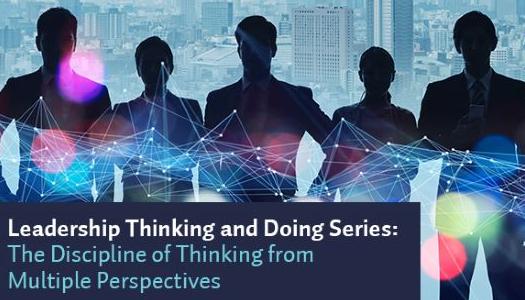Leadership Thinking and Doing Series

The Discipline of Thinking from Multiple Perspectives
It's not Easy to Think Without Blinders
Thinking about social issues, people and events in our working or personal lives from multiple perspectives is not so easy. All events, people and issues are characterized and influenced by multiple factors which are typically attended to and understood in different ways by almost everyone. How a person thinks or, in essence, focuses their attention, is influenced by cognitive capacities, history of socialization and education, family of origin biases, emotional experience with the situation, group affiliation and controls, and experiences of engagement responding to the event or people. In other words, nobody is objective – the mind interprets and perceives all phenomena from a cognitive and emotional decipher that has been shaped by our history and experiences. Cognitive scientists have long studied the peculiar capabilities of the human mind to perceive and process information in selective ways – often to reaffirm a pre-conceived opinion or decision. This is the stuff of biases and prejudices…often the blinders that influence every part of our lives.
Self-Awareness is a Starting Place
So what does this have to do with leaders thinking about issues from multiple interpretations and with diverse social perspectives. Well first of all, leaders need to acknowledge that how they think about things – anything in the world – will be influenced by prior conditioning and socialization, what they already know, and what they have experienced. There can be rigid blinders to perceive different interpretations. Secondly how leaders think about things will be influenced by how they are emotionally engaged in the topic. Emotional threats or euphoria can shut down critical thinking and analytical skills and create defensive reactions that block communication and further productive action. Thirdly how leaders think about things will be influenced by who they have around them and who they are in dialogue with. As social beings, people have a strong tendency to conform to opinions of those around them, consequently if one associates only with others of similar background and perspectives, it will be difficult to perceive alternative perspectives. It takes discipline and conscious intention to override these forces. The discipline of critical thinking requires self awareness of how one’s past life has shaped how one sees the world, practice in self-regulating emotional reactions , and encouragement of ideas and differing perspectives from diverse others.
Resources to Develop Your Personal Strategies
A few resources offered below might help one become aware of thoughts patterns, biases and emotional barriers that constrain how you think. What strategies might you adopt to strengthen your critical thinking skills to perceive alternative interpretations and perspectives.
Bukowski, H.(2019). Self-Knowledge. In V. Zeigler-Hill & T. K. Shackelford (Eds.), Encyclopedia of Personality and Individual Differences(pp. 1–5). Cham: Springer International Publishing. doi:10.1007/978-3-319-28099-8_2004-1
Carlson, E. N. (2013). Overcoming the barriers to self-knowledge: Mindfulness as a path to seeing yourself as you really are. Perspectives on Psychological Science, 8(2), 173-186.
Clark, J.M. and Polesello, D. (2017), Emotional and cultural intelligence in diverse workplaces: getting out of the box, Industrial and Commercial Training, 49(7/8) 337-349. https://doi.org/10.1108/ICT-06-2017-0040
Gerasimova, K. (2017). How to challenge your mental models and think differently. Retrieved from https://gothamculture.com/2017/03/23/challenge-mental-models-think-differently/
Nesbit, P. L. (2012). The role of self-reflection, emotional management of feedback, and self-regulation processes in self-directed leadership development. Human Resource Development Review, 11(2), 203-226.
Serrat, O. (2017). Understanding and developing emotional intelligence. In Knowledge Solutions (pp. 329-339). Springer, Singapore.
Surdek, S. (2017, August 31). Why Understanding Other Perspectives Is A Key Leadership Skill. Retrieved from https://www.forbes.com/sites/forbescoachescouncil/2016/11/17/why-understanding-other-perspectives-is-a-key-leadership-skill/#27da3ce86d20
Walinga, J., & Rowe, W. (2013). Transforming stress in complex work environments. International Journal of Workplace Health Management, 6(1), 66-88